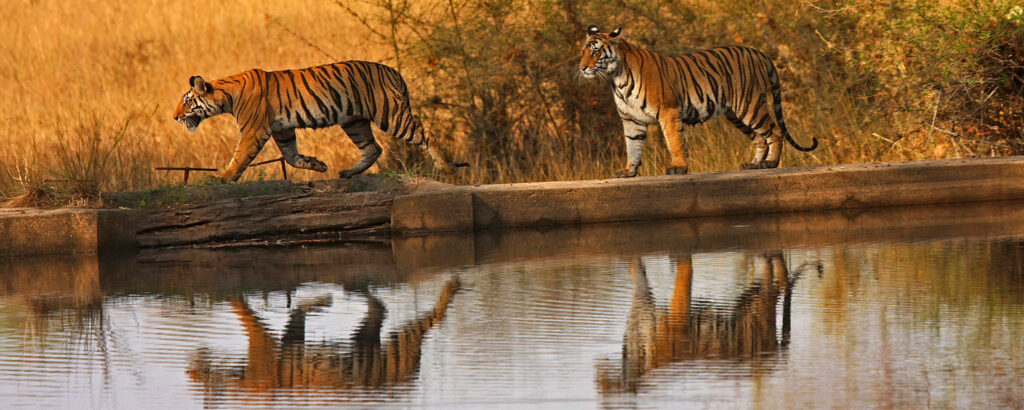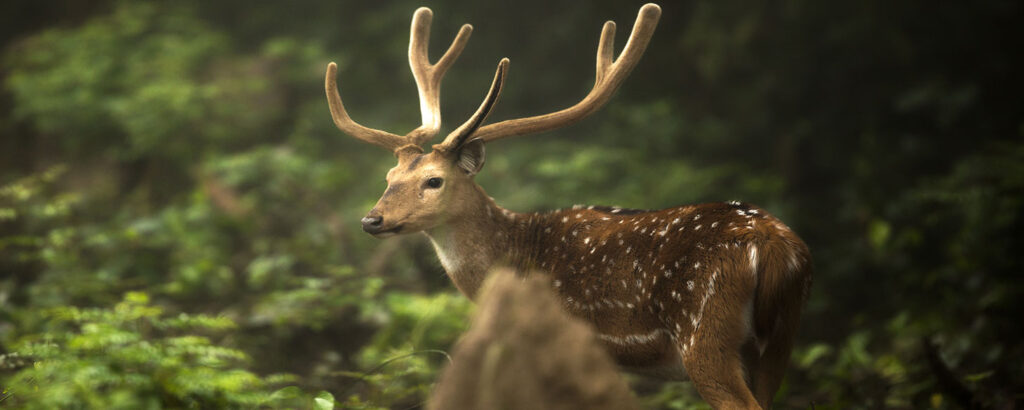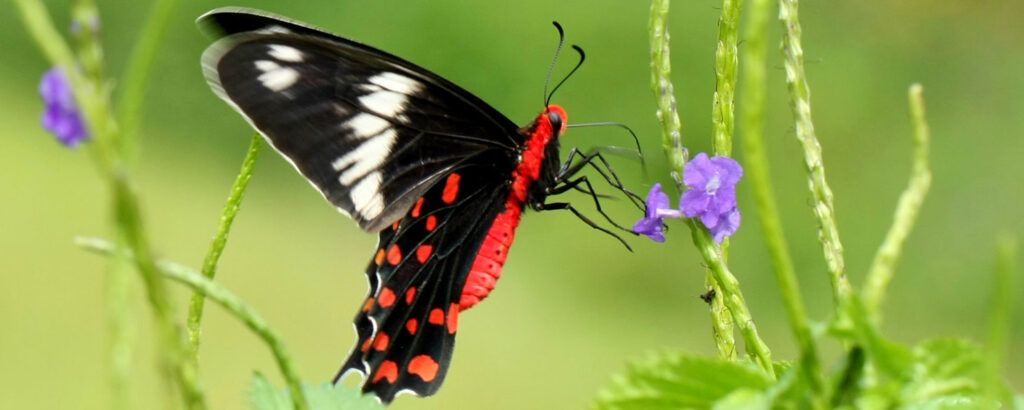Flora & Fauna in Bandhavgarh
Flora in Bandhavgarh National Park
- Sal (Shorea robusta),
- Saj (Terminalia tomentosa),
- Dhaora (Anogeissus latifolia),
- Tendu (Diospyros melanoxylon),
- Arjun (Terminalia arjuna),
- Amla (Emblica officinalis),
- Palas (Butea monosperma),
- Salai (Boswellia serrata),
- Bhirra (Chloroxylon sweitenia),
- Camar (Gmelina arborea),
- Dhaman (Grewia tilifolia),
- Mango (Mangifera indica),
- Jamun (Syzygium Cumini),
- Bamboo (Dendrocalamus Strictus),etc.

Fauna in Bandhavgarh National Park
Chinkara, still rather shy, can be sighted on the grassland areas of the park, particularly on the formerly cultivated land in the southern extension area on the edges of the main viewing area. The main prey animal, however for the Tigers and the park’s rarely sighted leopards are the chital, which now number a few thousand.
Also to be seen in the grasslands are Nilgai, Chausingha and sounders of Wild Boar, as well as the occasional Jackal or Fox. Muntjac and sambhar prefer denser vegetation. There are two types of monkeys common in the park-the rhesus macaque and the black faced langur. ;Drives can also reveal jungle cats, hyenas, ratels, porcupines and a variety of other mammals.
Bandhavgarh attracts many migratory birds in the winter months, including the birds of prey like the steppe eagle and a variety of wildfowl.
However as it has limited water surfaces it cannot compete with parks with large areas of wetland. Attracted by flowering and fruiting trees, some; very attractive and less common birds can be seen – like the blue bearded bee eater, white bellied drongo, Tickell’s blue flycatcher, white browed fantail, minivets, white Malabar hornbills and wood shrikes. Other fruiting trees reveal a large population of green pigeons, the noisy blossom headed parakeets.
Read more on our Bandhavgarh Travel Guide.
Reptiles and Butterflies
Unfortunately, there has been little work done on some important aspects of the park’s fauna such as the reptiles, amphibians and insects generally. What follows is a hodge – podge of the very patchy identification work done on a few reptiles, butter – flies and a couple of spiders. It is to be hoped that this will provoke those knowledgeable in these particular areas to help fill these rather large gap.
Reptiles
1. Indian Mud or Flap- shell Turtle
Lissemys punctata
2. Northern House Gecko
Hemidactylus flaviviridis
3. Fat – tailed Gecko
Eublepharis macularius
4. Common Garden Lizarde
Calotes versicolor
5. Forest calotes
Calotes rouxi
6. Common Skink
Mabuya carinata
7. Common Indian Monitor
Varanus bengalensis
8. Indian Python
Python Molurus
9. Dhaman or common Rat Snake
Ptyas mucosus
10. Common Wolf Snake
Lycodon aulicus
11. Buffstriped Keelback
Amphiesma stolata
12. Common Green Whip Snake
Ahaetulla nasutus
13. Common indian Krait
Bungarus caeruleus
14. Indian Cobra
Naja naja
15. Russell’s Viper
Vipera russelli.

Butterflies
Again not much is known bout them. The best times for them are late June to early July, September -October and late November, although different species are seen throughout the year.
| Group | Species | Preferred Habitat |
| Swallowtails | Common Rose (Pachliopta aristolochiae) | Weed Grassland/Open Wood |
| Crimson Rose (Pachliopta hecto) | ” ” ” “ | |
| Lime Yelow Butterfly (Papiliospop) | Weed Grassland | |
| Common Mormon (Papilio polytes) | Weed Grassland | |
| Whites &Yellows | Common Jezebel (Delias Eucharis) | Weed Grassland |
| Yellow Orange Tip (lxias pyrene) | Open Woodland | |
| Common Emigrant (Catopsiliapomona) | Weed Grassland | |
| Common Grass Yellow (Eurema hecabe) | Weed Grassland | |
| Blues | Zebra Blue (Syntarucus plinius) | Weed Grassland |
| Pale Grass Blue (Zezeeria maha) | Open Wood / Weed Grassland | |
| Gram Blue (Euchrysops Cnejus) | Weed Grassland | |
| Common Silverline (Spindosis vulcanus) | Open Wood / Weed Grassland | |
| Plum Juay (Abisara echerius) | Dense Wookland | |
| Milkweed Butterflies | Plain Tiger (Danaus chrysippus) | Grassland/Open Woodland |
| Striped Tiger (Danaus genutia) | Grassland/Open Woodland | |
| Glassy Tiger (Parantica aglea) | Grassland/Open Woodland | |
| Common Crow (Euploea core) | Weed Grassland/Open wood | |
| Browns | Common Evening Brown (Melanites leda) | Dense Wookland |
| Nymphalids | Angled Castor (Ariadne ariadne) | Open Woodland |
| Common Leopard (Phalanta phalantha) | Weed Grassland/Open Wood | |
| Lemon Pansy (Junonia lemonias) | Weed Grassland/Open Wood | |
| Yellow Pansy (Junonia hierta) | Weed Grassland/Open Wood | |
| Peacock Pansy (Junonia almana) | Weed Grassland/Open Wood | |
| Chocolate Pansy (Precis iphita) | Weed Grassland/Open Wood | |
| Blue Pansy (Junonia orithya) | Open Woodland Part NearWater | |
| Grey Pansy (Junonia atlites) | Marshy Grassland | |
| Danaid Eggfly (Hylpolimnas missipus) | Open Woodland/Weed Grass | |
| Blue Oakleaf (Kallima horsfieldi) | Dense Forest | |
| Common Sailor (Neptis hylas) | Weed Grassland/Open wood | |
| Baronet (Synphaedra nais) | Weed Grassland/Open Wood Dense wood | |
| Tawny Costor (Acraea terpsicore) | Weed Grassland/ Open Wood/Dense Woodland | |
| Skippers | Indian Grass Demon (Udaspes folus) | Weed Grassland |
